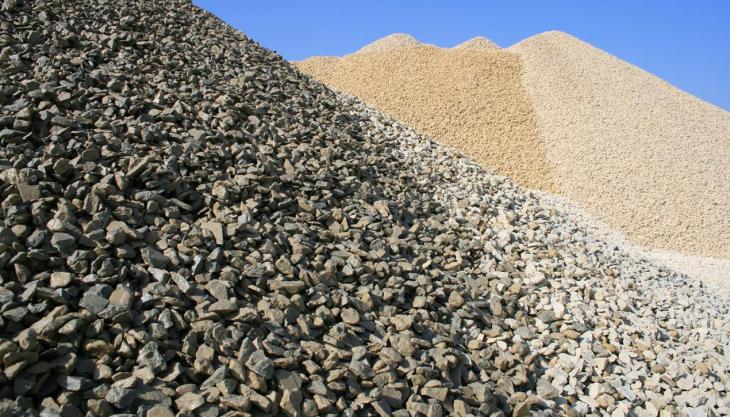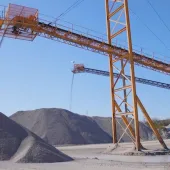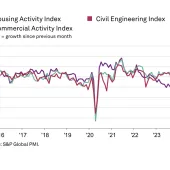Sharp rise in demand for mineral products

Construction industry demand for mineral products saw double-digit growth during 2021
DEMAND for mineral products such as aggregates, concrete, asphalt, and mortar in Britain recorded double-digit growth during 2021, representing a sharp recovery from the pandemic-induced slowdown a year earlier.
The latest industry survey from the Mineral Products Association (MPA) shows that volumes of primary aggregates increased by 15.7% on an annual basis in 2021, 14.1% for ready-mixed concrete, 12.5% for asphalt, and 24.4% for mortar.
Survey results also show that construction demand remained strong in the final quarter of the year, in spite of unprecedented supply bottlenecks impacting progress on construction sites, cost increases, and higher uncertainty due to Omicron.
Sales volumes of aggregates and ready-mixed concrete grew by 3.8% and 5.9% respectively in the fourth quarter of 2021, compared with the previous quarter, whilst asphalt and mortar sales recorded small quarterly declines, but total demand remained elevated.
Overall, the recovery in mineral products demand last year has been faster than expected but also imbalanced, says the MPA. For instance, aggregates and asphalt sales in 2021 exceeded pre-pandemic levels in 2019 but sales of ready-mixed concrete and mortar remained weaker.
Asphalt and aggregates demand were supported by an acceleration in infrastructure work, including roads and major infrastructure projects such as HS2. Asphalt sales have maintained a historically high level of activity for the past 18 months, with producers working hard to meet pent-up demand from delayed road projects due to the pandemic, in addition to the demand stemming from the Government’s Road Investment Strategy 2 and an increase in demand from local authorities for repair and maintenance work.
By contrast, ready-mixed concrete sales in 2021 were 6.7% below 2019 volumes, with demand held back by the comparatively weaker recovery in new commercial tower projects. Mortar sales in 2021 were also lower than in 2019 but a robust pipeline of new housing starts and residential building contracts should support further growth in mortar demand this year.
At the start of 2022, feedback from MPA producer members indicates that Omicron has not caused major disruptions, whilst the number of positive Covid cases affecting employees was reported to have fallen back compared with the end of December.
Aurelie Delannoy, the MPA’s director of economic affairs, expects mineral products sales volumes to continue to grow over the next two years, albeit at a slower pace than recorded in 2021. ‘Momentum in infrastructure will be the key driver behind that growth, assuming work continues to progress on major projects such as HS2, Hinkley Point C, and Thames Tideway, and the delivery of five-year programmes in the regulated sectors matches current commitments,’ she said.
The MPA forecasts aggregates and ready-mixed concrete sales to grow by 3.0% year on year in 2022, 4.0% for asphalt, and 6.5% for mortar. Whilst current growth prospects are inevitably conditional on the timely delivery of the infrastructure pipeline, the mineral products industry is also having to navigate the wider potential fallout of supply chain bottlenecks on general construction activity and significant cost increases for a wide range of inputs, including energy, wages, and carbon.
MPA chief executive Nigel Jackson said: ‘I pay tribute to our members who met every challenge head-on in 2021 by overcoming shortages, disruptions, increased costs, and uncertainties and still delivered for the UK at a time when so many industries were unable to do so. Hopefully, the positive prospects for the next two years will build on that success, predicated on government plans and announcements for infrastructure and ambitions for housing materializing.
‘Building confidence for members to invest in people, assets, and resources, to ensure demand is supplied, underpins what MPA members seek from government. Mineral products remain the largest material flow in the economy and their supply should not be assumed given the constraints imposed by the current planning and permitting systems and the cumulative costs and impacts of the regulatory environment and poor implementation, which just seems to get worse. Government statements on cutting red tape are hollow and it is time that real action was taken to boost the industry’s competitiveness.’








